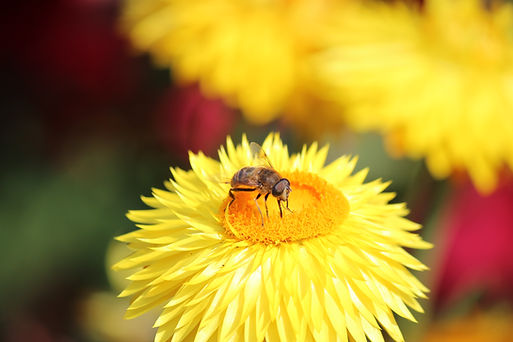
We are currently offering:
Concordia Bees
BeeKeeping Services

We offer full beekeeping services at our premises OR the location of your choice; from purchasing the bees and equipment to honey harvest and ongoing management.
We provide supplemental feed as part of the bee management as well as monitoring and pest management (treat mites, beetles and other hive diseases) throughout the process.
We also offer packaged bees and NUCs for your own beekeeping project or make recommendation on bee supplies and equipment.
Why BeeKeeping?
Beekeeping is recognized as an agricultural use due to the critical role bees play in the ecosystem:
-
Pollination: Bees are essential pollinators for a wide variety of crops. By facilitating pollination, they enhance crop yields and quality.
-
Biodiversity: Bees contribute to the maintenance of biodiversity in agricultural and natural ecosystems.
-
Honey Production: Besides pollination, beekeeping also contributes to agricultural productivity through the production of honey and other bee-related products.
With the monthly maintenance fee of this service, WE do all the required bee work needed. With your support, We will place and maintain your honeybees on your property making sure they get the best available service.
Note:
The "Texas Ag Tax Exemption" for beekeeping offers a valuable opportunity for landowners to engage in environmentally beneficial agricultural practices while enjoying reduced property taxes. The exemption recognizes the unique and crucial role of bees in agriculture and the broader ecosystem. Landowners interested in this exemption should focus on ensuring their land is primarily used for beekeeping and should be aware of any specific acreage requirements set by their local county.
BeeKeeping Approach

Every Honey bee colony should be Strong, healthy and productive.
Every beekeeper hopes for a thriving hive; a strong population, a healthy brood pattern, and abundant honey and pollen for the honey bees to feast on.
When you know the signs of a strong and healthy honey bee colony, you can quickly identify a weaker hive and take action to set it right proactively. Keep your honey bees in good health by looking out for these things during every hive inspection.
Today, the many threats to honey bee health — including parasites, pests, disease, pesticides, and inadequate nutrition — make achieving this goal a major challenge.
Successful beekeeping means closely monitoring bee health and taking proactive steps to protect them.

Bee Colony Management
What we offer
As part of our service, we can provide the bees, hive boxes and all equipment.
Beekeepers generally lose 30 to 40 percent of their bees each year to colony collapse disorder, varroa destructor mites and other causes.
We are responsible for losses to bee colonies under our management and we will replace with new colonies when they become available.
Our service also includes regularly feeding and inspecting the bees.
We provide integrated pest management for mites, small hive beetles and wax moths and we treat bees with organic controls. We limit the use of chemical pesticides in and around our hives.
We can help you with advice, information and recommendation on how to better manage your hives going forward. We make sure you have the best resources to ensure you receive the best possible service.


Live Honeybee Swarm Pick-Up
Bees swarms happen every spring. Swarms mean a beehive is no longer able to accommodate the large growth of many bees. So when a new queen hatches, she takes part of the old hive and leaves to find a new home.
Swarming is a natural occurrence in early spring.
Bees love to burrow inside trees, attics, and eaves of homes. Oftentimes, bees will stop to rest on a tree branch before continuing on to find shelter. When we remove a swarm, we strive to keep every bee alive as we move them to a safe area or a local beekeeper or apiary.
Live Bee Hive Removal
We believe it is important to save honey bees whenever possible. Through the use of specialized bee equipment, we can safely extract the hive from any structure and transport the bees to a local apiary.Our Beekeepers & Bee Removal Specialists also offers a turn-key service.If the bees reside inside your home, we will cut open the area, remove all the bees, wax, honey, and larvae.We wash the area with soap and water. Then, we refill the space with insulation. Finally, we replace any materials taken from your home, leaving it exactly as we found it.All beehive removals are guaranteed with a One-year warranty. Please give us a call to get more information on this service.
Full Hive Removal
A full hive removal is usually only necessary if the bee infestation has occurred within a few weeks. In the summer months, bees work quickly and we often see honey inside the space after just after a week. In some cases, Bees will inhabit a structure for long periods of time. In such situation, the bees have built up a substantial amount of wax, honey, and larvae. If the bees are removed and the hive is left inside the structure, not only will the wax and honey melt, causing possible damage to the inside the structure, but it draws numerous pests. We always recommend a hive removal or cleanup whenever honey is present.
![logo-transparent-png[1].png](https://static.wixstatic.com/media/ee8a48_25e3351875484d67a9ea6310214ca649~mv2.png/v1/fill/w_61,h_80,al_c,q_85,usm_0.66_1.00_0.01,enc_avif,quality_auto/logo-transparent-png%5B1%5D.png)